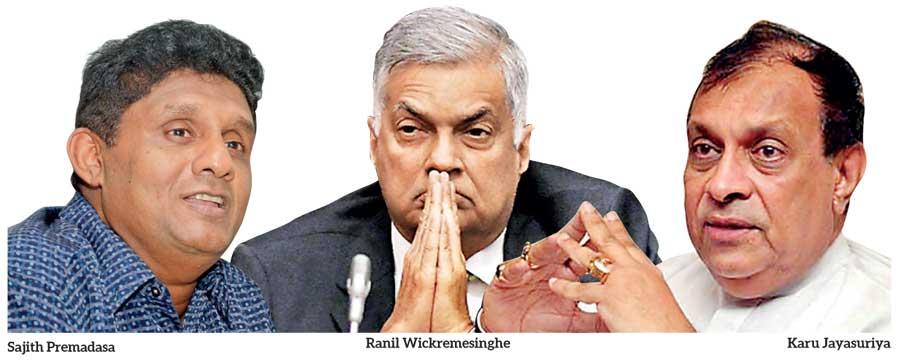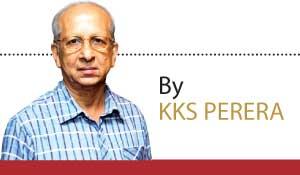Reply To:
Name - Reply Comment

Ranil Wickremesinghe, Sajith Premadasa and Karu Jayasuriya should work out a way out that will be best for the party and the country
SWRD Bandaranaike, Leader of the House was closely followed by a Rajapaksa when the former crossed the floor of House in July 1951, leaving the five-year-old UNP in the able-hands of the Senanayakes, Kotalawalas and Jayewardenes.
For DS Senanayake, who was manipulating the hierarchical structure of the party to promote his son Dudley to succeed him, it was a blessing in disguise.

Today, the scenario is different; an abrupt exit of Ranil, in spite of his unpopularity, he is a man with an abundance of political craftsmanship, experience and knowledge. In the midst of an erotically dialogued taped conversation, Ranjan and Hirunika appreciate the leader’s depths, comparing that with Deputy’s even using disparaging remarks.
Considering the strategies adopted, the utterance of braggadocio at the Presidential Poll, one can logically and rationally surmise, that the Grand Old Party will be left rudderless.
A descendant with a Binntenna ancestry, Don Bartholomew Senanayake, migrated to Hapitigam Korale in the in early 19th century and settled down in a hamlet called Botale, in Mirigama. Don Spater, his ambitious teenage son became a graphite miner.
Graphite was in great demand; profits generated therein he invested in plantations and arrack renting. Soon he became the owner of thousands of acres of plantations. [Arnold 1907:pp 611/614]. Realising, it is morally wrong to engage in the sale of alcohol, Spater, not only bade good-bye to arrack renting but, ironically became a staunch member of temperance movement [anti-arrack campaigner] at the turn of the century.
His three sons DC, FR and DS who studied at St Thomas’s College too joined in the movement before they made a mark in local politics. As dedicated activists of the temperance movement at the young age [all three in the twenties] encouraged by their father and many Buddhist leaders of the time, they even earned the wrath of the British Colonial bosses who feared the movement’s popularity for two reasons, firstly, the loss of state income, and secondly, the possibility of the campaign transforming itself into an anti-colonial ‘Quit Ceylon’ movement.
The Senanayakes, who spent generously on the anti-arrack movement were labelled ‘nobodies’ of Ceylonese Bourgeoisie by the Feudalist Elite of low-country in Siyane-Korale, Gampaha District. Mahamudhaliyar, Bandaranaike’s [father of SWRD] and Obeysekara’s ancestor, the Nayake Pandaram [Custodian of State Records] was a South Indian immigrant in 17th Century. During the 1915 Sinhala/Muslim riots, Governor Chalmers, who wined and dined with the above named local feudalist elite, ordered the unjust arrest of the 30-year-old Don Stephen, his two brothers along with many temperance leaders on trumped-up charges of instigating riots. They were confined to Welikada for months, while some were Court Martialled and executed by the military; mainly to suppress any future agitations suspected by them. The harsh treatment he received in His Majesty’s Prisons, produced a combatant who was determined to free the nation.
Ceylon Reform League and Ceylon National Association joined hands-on 11 December 1919 in forming a new political entity called Ceylon National Congress [CNC]; it was a nationalist political party led by Sir Ponnambalam Arunachalam and Sir James Peiris loyally supported by FR and DS Senanayake, DB Jayatilaka, EW Perera, and CWW Kannangara.
The long-standing accord as well as hostility among the families of Senanayakes, Kotalawalas and Jayewardenes, which formed the higher commanding authority of the UNP for five decades, could be understood as the power and wealth of a single entrepreneur in Don Charles Gemoris Artygalle of Madapatha, Piliyandala and his three sons-in-law who married Alice, Ellen and Lena, the three daughters of Mudliyar Artygalle. Each of them possessed over 2500 acres of cultivated Tea rubber and coconut [Ref. Kumari Jayawardena-2007 -pp 288] plus a fair share of Graphite mines. The three young men from prominent political families who married them were none other than, F. R. Senanayake [brother of DS and paternal uncle of Dudley]; John Kotelawala Snr. (Sir John’s father); and Col. T G Jayewardene [JRJ’s uncle].
The only brother of three Artygalle sisters, young Francis, heir apparent to a fortune was murdered in 1906. FR Senanayake’s efforts to bring the suspects to book with the assistance of Jayewardene family’s legal luminary resulted in an ex-police officer and B-in-L, John Kotelawala being arrested and prosecuted for the murder.
The most senior of the three, John Kotalawala [of Nainage Suuduwa fame] committed suicide in jail during the court proceedings, triggering a persistence feeling of ill-will leading to a family grudge, that extended and prevailed for decades within the UNP.
The sun was setting on the British Empire. In a surprise move, Colonial rulers granted the privilege of universal suffrage to Ceylon in 1931, along with other Constitutional reforms. This privilege was received 20 years before our big neighbour India.
"DS had an idea of forming a national political party with moderate views to represent a national consensus; a party necessarily of the majority, but acceptable to the Tamils and Muslims. He believed the CNC had lost the support of the minorities and the chances of regaining it was remote."
Sir DB Jayatillake retired as Leader of House; he was Vice President of the Legislative Council and a former Chairman of CNC during World War II. DS was the obvious choice to fill the void. He would protect the interests of all parties with greater confidence and skill than his predecessor the learned man, Sir DB Jayatillake, who was closer to Indian leaders. DS mistrusted Indian politicians; he believed India as the biggest threat to the sovereignty of Sri Lanka.
At the end of 1942, DS Senanayake pointed towards his displeasure with the novel policies and the new outlook of Congress, and he resigned from the Exco of CNC. By 1943 he severed all relations with it. The decision was based purely on policy issues: he opposed its aim of achieving complete freedom from Briton, the education proposals that favoured Swabhasha instead of English, and opening doors of Congress for Communist Party members. [DS preferred Dominion Status] Young nephew JR Jayewardene and son Dudley once proposed a freedom struggle parallel with the Indian model at a CNC session in the early 1940s. DS vehemently opposed the idea. However, DS lost to the two youngsters and announced his retirement from the Executive Committee of Congress.
DS stuck to his presumption that our freedom could be achieved through a friendly relationship with Britain. He perceived a process of friendly compromise, and he thought that nothing could be gained by petitioning the UN.
DS had an idea of forming a national political party with moderate views to represent a national consensus; a party necessarily of the majority, but acceptable to the Tamils and Muslims. He believed the CNC had lost the support of the minorities and the chances of regaining it was remote.
The United National Party (UNP), was born by amalgamating three Right-leaning political forces of the day, namely, the Sinhala Maha Sabha of SWRD Bandaranaike, the strong political entity formed on the lines of Indian National Congress, the Ceylon National Congress, and TB Jayah’s Muslim League.
DS Senanayake successfully united them under United National Party banner on September 6, 1946. The brilliant green elephant was the symbol of the United National Party, the successor to the CNC which died a natural death within a few years. The freedom or Dominion status achieved in 1948 as a result of DS Senanayake’s consensual approach.
“We should strive to achieve a truly independent stable state where all communities live together as equal citizens in peace and harmony and without having to experience any discrimination; achieving contentment in accordance with their diverse cultural and ethnic identities.”--DSS
“Most of the agitation for independence by others have been on the wrong lines. The British getting the fullest support for the war effort from the State Council headed by Senanayake, Dominion status was promised soon after the war. No breaking the word, there came to be appointed a Commission under Viscount Soulbury. “Soulbury Constitution’ it was called, but the fact is that it was produced by Mr Senanayake”- Sir Ivor Jennings: Former Vice-Chancellor of Peradeniya University.
Wickremesinghe, Premadasa and Jayasuriya should talk matters over and work out a way out that will be best for the party and the country as a whole. It is in their hands to get the membership out of the mess that they are responsible for creating. If they are not prepared to put their heads down collectively, the party rank and file, as well as grassroots, will get impatient.
Members who were on the sidelines as beleaguered onlookers are now getting openly critical and are beginning to put more pressure on all leaders. They are fed up of the current situation.
The ‘final’ meeting held last Thursday ended inconclusively with Ranil faction leaving the floor while Sajith loyalists remained and conducted an unscheduled, unplanned meeting that announced a ‘majority’ decision that Leader of the Opposition Sajith Premadasa should be the leader of the party, leader of the Alliance, Prime Ministerial nominee…you name it !
“Mey Premadasage putha…, addressed 150 meetings, this time I will speak at 300!” The many intelligent, smart, educated, and well-read men in his camp need to convey a message or two to their future ‘boss’, the London School of Economics graduate on the differencebetween rhetoric and oratory, and also how to use both in the correct context if they are to, more than winning a substantial number at forth-coming elections, but for the survival of Party.
The writer can be contacted at - [email protected]